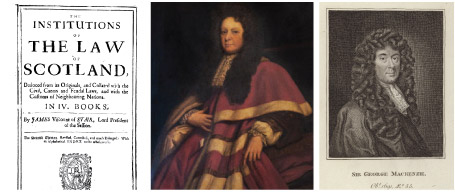3.1 The institutional writers
In the seventeenth and eighteenth centuries, lawyers wrote books setting out the principles and norms on which Scots law was based. They became known as the institutional writers. Their works have been given a special status and form an important source of Scots law. Written over a period of 150 years they include:
- Viscount Stair, The Institutions of the Law of Scotland (1681) – generally regarded as the greatest of the institutional writings.
- Sir Thomas Craig, Jus Feudale (1655)
- Sir George Mackenzie, The Laws and Customs of Scotland in Matters Criminal (1678)
- Sir George Mackenzie, Institutions of the Law of Scotland (1684)
- Lord Bankton, An Institute of the Law of Scotland (1751–1753)
- Lord Kames, Principles of Equity (1760)
- John Erskine, An Institute of the Law of Scotland (1773) and perhaps also his Principles of the Law of Scotland (1759)
- Baron David Hume, Commentaries on the Law of Scotland Respecting the Description and Punishment of Crimes (1797)
- George Joseph Bell, Commentaries on the Law of Scotland and Principles of Mercantile Jurisprudence (1804) and Principles of the Law of Scotland (1829)
- Archibald Allison, Principles of the Criminal law of Scotland (1833).
Stair, Bell and Erskine are the most well-known of these. In the 1660s, Stair brought together the elements of customary, feudal and Roman law into one system based on legal principles and philosophy in his leading work The Institutions of the Law in Scotland (1681). His work provided the first systematic statement of private law.
The relevance of the institutional writers can still be seen today. In their response to the Carloway Review (2012) the Senators of the College of Justice commented:
Scottish criminal law did not arrive at its present state overnight. The modern law is the product of centuries of development during which the law has grown and matured organically, partly through the analytical works of institutional writers, partly through experience of practical problems in the courts, and partly in response to emerging problems, political pressures and sometimes to controversial cases.

